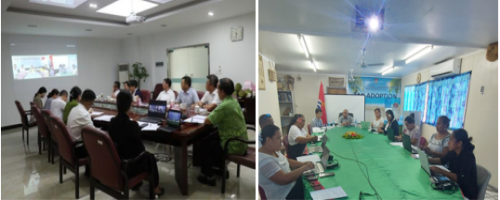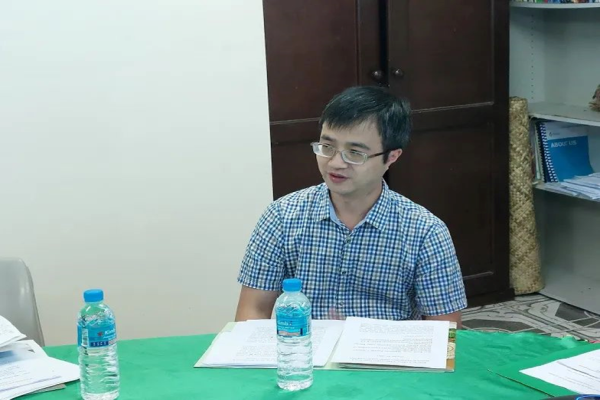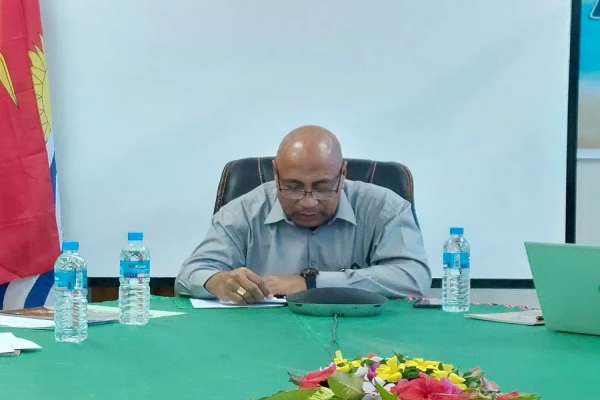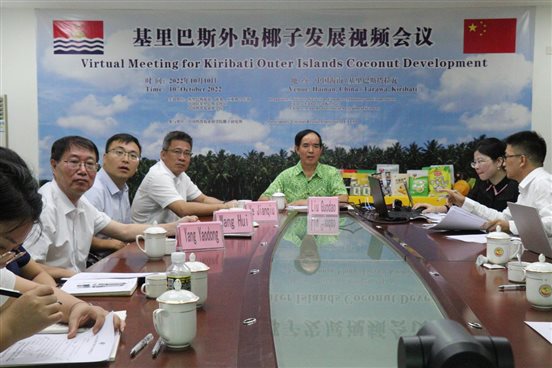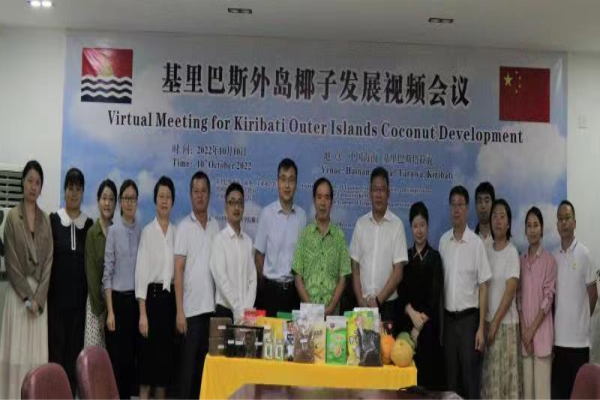On October 10th, the virtual meeting for Kiribati outer islands coconut development was hosted by the Chinese Embassy in Kiribati, Ministry of Tourism, Commerce, Industry and Cooperative (MTCIC) and Chinese Academy of Tropical Agricultural Sciences (CATAS), and organized by Coconut Research Institute of CATAS. Over 40 people have attended the meeting, including the Charge D’ Affairs Zhao Jian, MTCIC Minister Bootii Nauan, CATAS vice president Liu Guodao, the Party Secretary of Coconut Research Institute Ye Jianqiu, Foreign Affairs Bureau of Zhaoqing City, representatives from coconut equipment enterprises, MTCIC officers and representatives from coconut industry.
Wenchang Venue Tarawa Venue
In his opening remark, the Charge D’ Affairs Zhao Jian said that as coconut is the tree of life for Kiribati and a major source of income for people from the outer islands, Kiribati has prioritized the coconut development and put forward initiative to enhance production and export diversification. To support Kiribati coconut industry, CATAS experts proposed a coconut development plan for the outer islands based on the comprehensive coconut utilization experience in China, which will be implemented at earliest time under the cooperation between Chinese Embassy and the MTCIC. Since the resumption of diplomatic relations, achievements have been made in infrastructure, livelihood and sustainable development. Therefore, the cooperation could be further extended to help Kiribati develop coconut industry, boost the independent and sustainable development of Kiribati, improve the livelihood for people living in the outer islands, and thus contribute to KV20.
Charge D’ Affairs Zhao Jian addressed at the meeting
MTCIC Minister Bootii Nauan appreciated China’s technological assistance in coconut development. He said that Kiribati’s abundant coconut resources hold great potential for value-added production. However, Kiribati has long relied on copra to produce coconut oil, restricting efficient coconut use and job opportunities. He hoped China could provide continuous support in coconut development covering the entire value chain by more technical assistance and training programs, helping Kiribati produce a greater variety of quality coconut products and diversifying its production and exports.
MTCIC Minister Bootii Nauan giving a speech
CATAS vice president Liu Guodao introduced whole-chain technologies developed by CATAS for various tropical fruits, including coconuts. These technologies have won recognition by wide application in more than 40 countries and regions. Also, CATAS is designated by the FAO as the “Reference Center for Tropical Agricultural Research and Training”. Also, thanks to previous communications, CATAS has proposed the coconut development plan based on the local conditions of Kiribati. He hoped that the plan would be implemented in the future with the help of Chinese Embassy and Kiribati.
Vice president Liu Guodao delivering a speech
Dr. Zhang Yufeng from Coconut Research Institute of CATAS reported coconut products and processing equipment suitable for Kiribati, introducing advanced technologies in coconut plantation, processing and production. In addition, by taking into consideration the outer islands’ coconut resources and power supply, Dr. Zhang proposed product portfolio of desiccated coconut, coir bricks, shell charcoal, shell buttons, production equipment and factory design, demonstrated the production process through videos, and made brief suggestions on future cooperation. With a refreshed understanding of coconut development of outer islands, Kiribati acknowledged the plan starting from which they hoped to strengthen the cooperation with China, expand the coconut value chain and improve the livelihood of people living in the Outer Islands.
MTCIC officers listening to Chinese expert’s introduction
In addition, suitable coconut products, the production capacity and prices of production equipment and establishing China-Kiribati joint laboratory were also discussed at the meeting. It was also agreed to dispatch Chinese experts to Kiribati to conduct research and training for future in-depth cooperation. Next CATAS will help Kiribati pursue the KV20 and improve China’s influence in the Belt and Road countries based on Kiribati’s requests and the guidance from the Chinese Embassy.
Representatives from the CATAS
